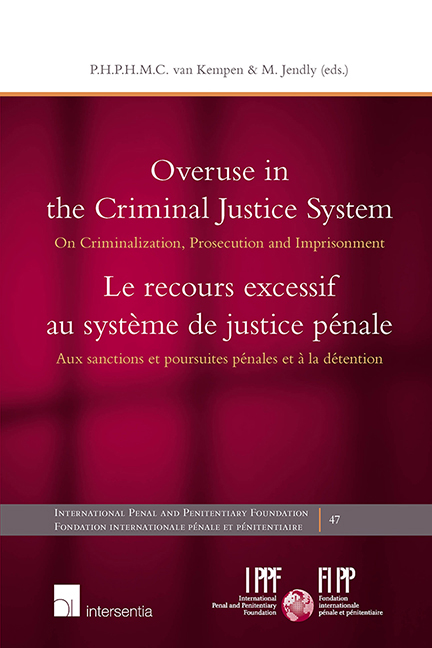Book contents
- Frontmatter
- Dedication
- Contents
- Acknowledgements
- Remerciements
- PART I INTRODUCTORY SYNTHESIS AND ANALYSES 1ÈRE PARTIE. SYNTHÈSE ET ANALYSES INTRODUCTIVES
- PART II THEMES 2ÈME PARTIE. THÈMES
- PART III NATIONAL REPORTS 3ÈME PARTIE. RAPPORTS NATIONAUX
- Overuse in the Criminal Justice System in Argentina
- Le recours au système de justice pénale en Belgique: état des lieux et perspectives
- Overuse of Criminal Law in Finland
- Overuse in the Criminal Justice System in Germany
- Overuse in the Criminal Justice System in Greece
- Overusing the Criminal Justice System: the Case of Ireland
- Overuse in the Criminal Justice System in Japan
- Tendencies of Overuse in Criminal Law Policy and Criminal Law Enforcement in the Netherlands
- Overuse in the Criminal Justice System in New Zealand
- Overuse in the Criminal Justice System in Nigeria
- Overuse in the Criminal Justice System in Poland
- Overuse in the Russian Criminal Justice System
- Overuse in the Criminal Justice System in Spain
- Recourt-on de manière excessive au système pénal en Suisse?
- Overuse of the Criminal Justice System in Taiwan
- Overuse and Underuse of the United States Criminal Justice System in the Area of Business Crimes
- The International Penal and Penitentiary Foundation: history and purpose
- La Fondation internationale pénale et pénitentiaire: histoire et objectif
- The IPPF Series
Overuse and Underuse of the United States Criminal Justice System in the Area of Business Crimes
from PART III - NATIONAL REPORTS 3ÈME PARTIE. RAPPORTS NATIONAUX
Published online by Cambridge University Press: 26 June 2019
- Frontmatter
- Dedication
- Contents
- Acknowledgements
- Remerciements
- PART I INTRODUCTORY SYNTHESIS AND ANALYSES 1ÈRE PARTIE. SYNTHÈSE ET ANALYSES INTRODUCTIVES
- PART II THEMES 2ÈME PARTIE. THÈMES
- PART III NATIONAL REPORTS 3ÈME PARTIE. RAPPORTS NATIONAUX
- Overuse in the Criminal Justice System in Argentina
- Le recours au système de justice pénale en Belgique: état des lieux et perspectives
- Overuse of Criminal Law in Finland
- Overuse in the Criminal Justice System in Germany
- Overuse in the Criminal Justice System in Greece
- Overusing the Criminal Justice System: the Case of Ireland
- Overuse in the Criminal Justice System in Japan
- Tendencies of Overuse in Criminal Law Policy and Criminal Law Enforcement in the Netherlands
- Overuse in the Criminal Justice System in New Zealand
- Overuse in the Criminal Justice System in Nigeria
- Overuse in the Criminal Justice System in Poland
- Overuse in the Russian Criminal Justice System
- Overuse in the Criminal Justice System in Spain
- Recourt-on de manière excessive au système pénal en Suisse?
- Overuse of the Criminal Justice System in Taiwan
- Overuse and Underuse of the United States Criminal Justice System in the Area of Business Crimes
- The International Penal and Penitentiary Foundation: history and purpose
- La Fondation internationale pénale et pénitentiaire: histoire et objectif
- The IPPF Series
Summary
INTRODUCTION
The United States criminal justice system is plagued with instances of both overuse and underuse. The concept of “overuse” includes overcriminalization through excessive and overbroad criminal statutes and regulations, as well as staggering imprisonment rates. “Underuse” is usually exemplified by underenforcement of violent street crimes, particularly in deprived urban neighborhoods. In the area of business crimes, also called “white-collar crimes” since the pioneer studies of Edwin Sutherland, both overuse and underuse acquire different dimensions and specific characteristics. In general terms, overuse is characterized by an excessive number of criminal provisions often lacking definitional clarity and sufficient mens rea requirements. Paradoxically, this type of overuse of the criminal justice system coexists with a historical trend towards underusing criminal justice regarding white-collar offenders by overlooking their actions or benefitting them with privileged treatment. While these phenomena of overuse and underuse coexist, the prevalence of one or the other is cyclical. This paper will explain both overuse and underuse in the field of business crimes, as well as the cycles of prevalence of one or the other in recent times. Overuse will be dealt specifically under the label of overcriminalization of business crimes and underuse will be addressed as underenforcement of criminal justice towards white-collar offenders based on preferential treatment.
OVERCRIMINALIZATION OF BUSINESS CRIMES
According to Todd Haugh, the proliferation of criminal provisions has occurred more frequently in the area of corporate and white-collar crime than in other fields. He underscores that white-collar crime generated the biggest expansion of federal law during the 1970s and 1980s, followed by a new phase of overcriminalization at the beginning of the twenty-first century with the enactment of the Sarbanes-Oxley Act. Overcriminalization takes the form of thousands of criminal statutes and regulations scattered throughout the federal code and thousands of regulations in the area of business-related criminal law. There is a panoply of criminal pitfalls, particularly in the area of international business transactions.
Besides this quantitative form of overcriminalization, even more problematic is the overcriminalization in the qualitative sense, which consists of enacting criminal offenses too broad in scope, poorly defined, and overlapping.
- Type
- Chapter
- Information
- Overuse in the Criminal Justice SystemOn Criminalization, Prosecution and Imprisonment, pp. 615 - 630Publisher: IntersentiaPrint publication year: 2019

